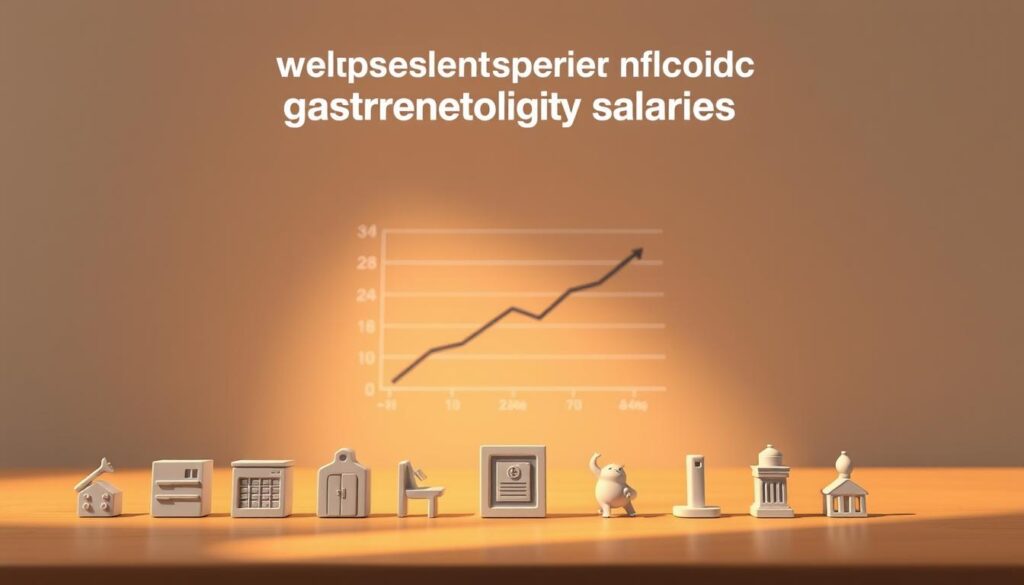Key Takeaways
- Average Gastroenterologist Salary in the US
- Key Factors Influencing Gastroenterologist Salaries
- Gastroenterologist Salary by State
- How Gastroenterologist Salaries Compare to Other Specialties
Gastroenterology ranks among the most rewarding medical specialties, with 91% of practitioners stating they would choose this field again. This high satisfaction rate reflects both the specialty’s intellectual challenges and its strong financial prospects.
The path to becoming a gastroenterologist requires 14 years of education and training, including medical school and fellowship. Physicians must also pass the Gastroenterology Certification Examination to earn board certification.
Compensation reflects this extensive training, placing gastroenterologists among the top-earning medical professionals. Their expertise in digestive health ensures steady demand, making this a stable career choice.
Key Takeaways
- Gastroenterology has a 91% career satisfaction rate.
- Training involves 14 years of education and residency.
- Board certification is mandatory for practice.
- The specialty ranks 6th in physician earnings nationwide.
- Extended training correlates with higher earning potential.
Average Gastroenterologist Salary in the US
Board-certified specialists in digestive health currently earn a median income of $515,000 annually. This figure, reported in Medscape’s 2024 compensation survey, reflects a $15,000 increase from the previous year.
2024 Salary Benchmarks
The current median compensation for certified practitioners stands at $515,000. This positions the specialty among the highest-earning medical fields nationwide. Residents, however, earn $63,600 during training, with additional stipends for on-call duties.
Salary Growth Trends (2022-2024)
Earnings have grown at a 3% compound annual rate since 2022. The upward trajectory aligns with broader physician salary trends but outpaces inflation-adjusted wage growth in other specialties.
Projections for 2025 suggest continued increases, driven by demand for digestive health services. Private practice incentives and employed positions further influence these figures.
Key Factors Influencing Gastroenterologist Salaries
Multiple variables shape earnings for digestive health specialists, with practice settings playing a decisive role. Compensation reflects clinical expertise, operational models, and regional demand. Below are the primary drivers of income variation.

Experience and Subspecialization
Senior practitioners typically earn 20–30% more than early-career peers. Advanced training in hepatology or motility disorders further increases earning potential. Subspecialties like therapeutic endoscopy command premium fees due to technical demand.
Practice Type: Private vs. Employed
Private practice generates higher revenue but requires managing overhead. Employed positions offer stability with fixed salaries. The table below illustrates key contrasts:
| Factor | Private Practice | Employed Position |
|---|---|---|
| Median Income | $440,000 | $393,000 |
| Autonomy | High | Moderate |
| Bonus Potential | 18–25% of revenue | 10–15% of base pay |
Performance Incentives
Bonuses contribute 15% ($63k average) to total compensation. Most physicians meet 75% of annual targets, with top performers exceeding benchmarks. Additional income streams include:
- Consulting fees for pharmaceutical trials
- Research grants for academic affiliations
- Speaking engagements at medical conferences
Wealth accumulation patterns reveal 16% of specialists achieve net worth exceeding $5 million. This correlates with diversified revenue strategies and long-term practice ownership.
Gastroenterologist Salary by State
Regional differences significantly impact compensation for digestive health specialists across the US. Data indicates 30% variation in earnings between states, with metropolitan areas commanding premium rates.
Top-Paying States
California leads with median compensation of $598,000 per year, followed by New York ($572,000) and Texas ($543,000). These states combine high patient volumes with complex case mixes that justify premium billing.
Urban centers demonstrate even greater earnings potential:
- Los Angeles: 12% above state average
- Houston: 9% metro premium for endoscopic specialists
- Manhattan: 18% higher than upstate counterparts
Cost-Adjusted Earnings
North Dakota and Nebraska report lower nominal wages ($412,000) but superior purchasing power. The table below compares real income value:
| State | Nominal Salary | Cost-of-Living Index | Adjusted Value |
|---|---|---|---|
| California | $598,000 | 151.7 | $394,000 |
| Nebraska | $412,000 | 89.1 | $462,000 |
| New York | $572,000 | 139.1 | $411,000 |
Rural practice incentives include federal loan repayment programs and tax benefits. However, Medicaid reimbursement rates vary by 43% between states, significantly affecting net income.
How Gastroenterologist Salaries Compare to Other Specialties
Compensation trends in medicine reveal stark contrasts between procedural and non-procedural specialties. Gastroenterology occupies a unique middle ground, outperforming primary care but trailing surgical disciplines.
Primary Care and Pediatric Benchmarks
Pediatricians earn $266,000 annually—$187,000 less than digestive health specialists. This gap reflects procedural volume differences. Primary care roles face lower reimbursement rates for cognitive services versus endoscopic interventions.
High-Earning Procedural Specialties
Orthopedics ($733,000) and cardiology ($609,000) lead earnings rankings. These fields involve complex surgeries and implant revenues. Gastroenterology ranks 5th among 29 tracked specialties, with advantages:
- Lower malpractice premiums than surgery
- Shorter patient recovery cycles
- High-demand outpatient procedures
| Specialty | Median Salary | Procedural Focus |
|---|---|---|
| Orthopedics | $733,000 | 92% procedural |
| Cardiology | $609,000 | 88% procedural |
| Gastroenterology | $515,000 | 76% procedural |
| Pediatrics | $266,000 | 12% procedural |
Lifetime earnings for a doctor in gastroenterology average $22 million—35% higher than primary care. Market forces like ASC ownership further amplify income potential for procedural physicians.
Job Satisfaction and Compensation Sentiment
Clinical rewards extend beyond financial metrics in this medical specialty. A 2024 Medscape report reveals 56% of practitioners feel undercompensated despite top-quintile earnings. This perception gap persists across practice settings and experience levels.

The profession shows divergent attitudes toward compensation. While 44% express contentment with earnings, younger specialists report higher dissatisfaction rates. Generational expectations and debt burdens influence these views.
Perceptions of Fair Pay
Patient care quality remains the primary satisfaction driver for 32% of specialists. Diagnostic accuracy and treatment success outweigh income considerations for many. Key non-financial rewards include:
- Long-term patient relationships (cited by 61%)
- Complex case resolution (48%)
- Academic contributions (27%)
Workplace Challenges and Stressors
Administrative demands reduce clinical time for 23% of practitioners. Regulatory compliance accounts for 18 weekly hours on average. Stress-reduction strategies gaining traction:
- Locum tenens roles (6% adoption)
- Team-based care models
- Electronic health record optimization
The healthcare system’s evolving demands create tension between job satisfaction and bureaucratic requirements. Those balancing both aspects demonstrate 40% higher career longevity.
Financial Considerations for Gastroenterologists
Medical training investments require strategic debt management to maximize earning potential. The average debt-to-income ratio for early-career specialists reaches 0.54, demanding tailored financial solutions.
Student Debt and Repayment Strategies
Median student debt of $200,000 accrues $365,000–$440,000 in lifetime repayment costs. Income-driven plans during residency reduce monthly burdens by 62% compared to standard repayment.
Refinancing at 3.5% interest yields $67,000 in long-term savings. Key thresholds for private refinancing:
- Credit scores exceeding 720
- Debt-to-income ratios below 1.5
- Employment contracts with 2+ years remaining
| Strategy | 10-Year Cost | Best For |
|---|---|---|
| Standard Repayment | $440,000 | High-earning private practice |
| Income-Driven | $365,000 | Fellowship trainees |
| Refinanced (3.5%) | $373,000 | Established practitioners |
Public Service Loan Forgiveness for Nonprofit Roles
PSLF eliminates $191,000–$310,000 in debt after 10 years of qualifying payments. Academic hospitals and FQHCs meet program requirements, with 4 years of post-fellowship service counting toward forgiveness.
“PSLF applicants should submit annual employment certifications to avoid payment tracking errors.”
Tax implications vary by state—18 states treat forgiven amounts as taxable income. Fellowship deferment periods require careful monitoring to prevent unwanted capitalization.
Future Outlook for Gastroenterologist Salaries
Demographic and technological shifts are transforming gastroenterology practice economics. The aging U.S. population will drive an 11% increase in digestive health service demand by 2032. This surge correlates with rising incidence rates of complex GI conditions among seniors.
Projected Demand and Salary Growth
Procedural volume will expand fastest in these areas:
- Colorectal cancer screenings (18% projected increase)
- IBD management for aging patients
- Advanced endoscopic interventions
Value-based care transitions may reduce per-procedure payments but increase quality bonuses. Medicare’s 2% reimbursement cut for 2024 will be offset by higher private insurer rates in most markets.
Impact of Healthcare Policies and Technology
AI-assisted endoscopy tools boost productivity by 15-20% in pilot programs. These systems enhance detection rates while maintaining physician oversight. Key policy factors include:
| Factor | Positive Impact | Negative Impact |
|---|---|---|
| Telehealth expansion | +9% follow-up capacity | -3% visit reimbursement |
| Biologic therapies | +$28k annual revenue | +12% admin costs |
Endoscopy center ownership remains lucrative, with ASCs generating 38% higher margins than hospital-based units. However, certificate-of-need laws in 28 states limit market entry.
These dynamics create new pathways for gastroenterology career advancement. Specialists adapting to technological and payment model changes will achieve the strongest earnings growth.
Conclusion
Over three-quarters of specialists prioritize patient care over annual salary, reflecting the specialty’s clinical rewards. Non-financial motivations, including complex case resolution, drive long-term career satisfaction.
One-third pursue supplemental gastroenterologist job opportunities, such as consulting or research roles. Locum tenens positions provide flexibility for late-career transitions or partial retirement.
Long-term sustainability requires planning for recertification costs ($2,300 biennially) and retirement contributions. Portfolio models blending clinical and non-clinical work expand job opportunities while maintaining income stability.
FAQ
What is the average annual income for gastroenterologists in the US?
In 2024, the median compensation ranges between 0,000 and 0,000, varying by experience, location, and practice setting.
How does compensation compare between private practice and employed positions?
Private practitioners often earn higher incomes but face operational costs, while employed roles offer stability with benefits and bonuses.
Which states offer the highest pay for this specialty?
States like California, New York, and Texas typically report higher earnings due to demand and cost-of-living adjustments.
How does student debt impact early-career professionals?
Many utilize repayment plans or Public Service Loan Forgiveness (PSLF) when working in nonprofit hospitals to manage educational loans.
What trends are expected to influence future earnings?
Growing demand for digestive health services and advancements in endoscopic technology may drive salary increases.